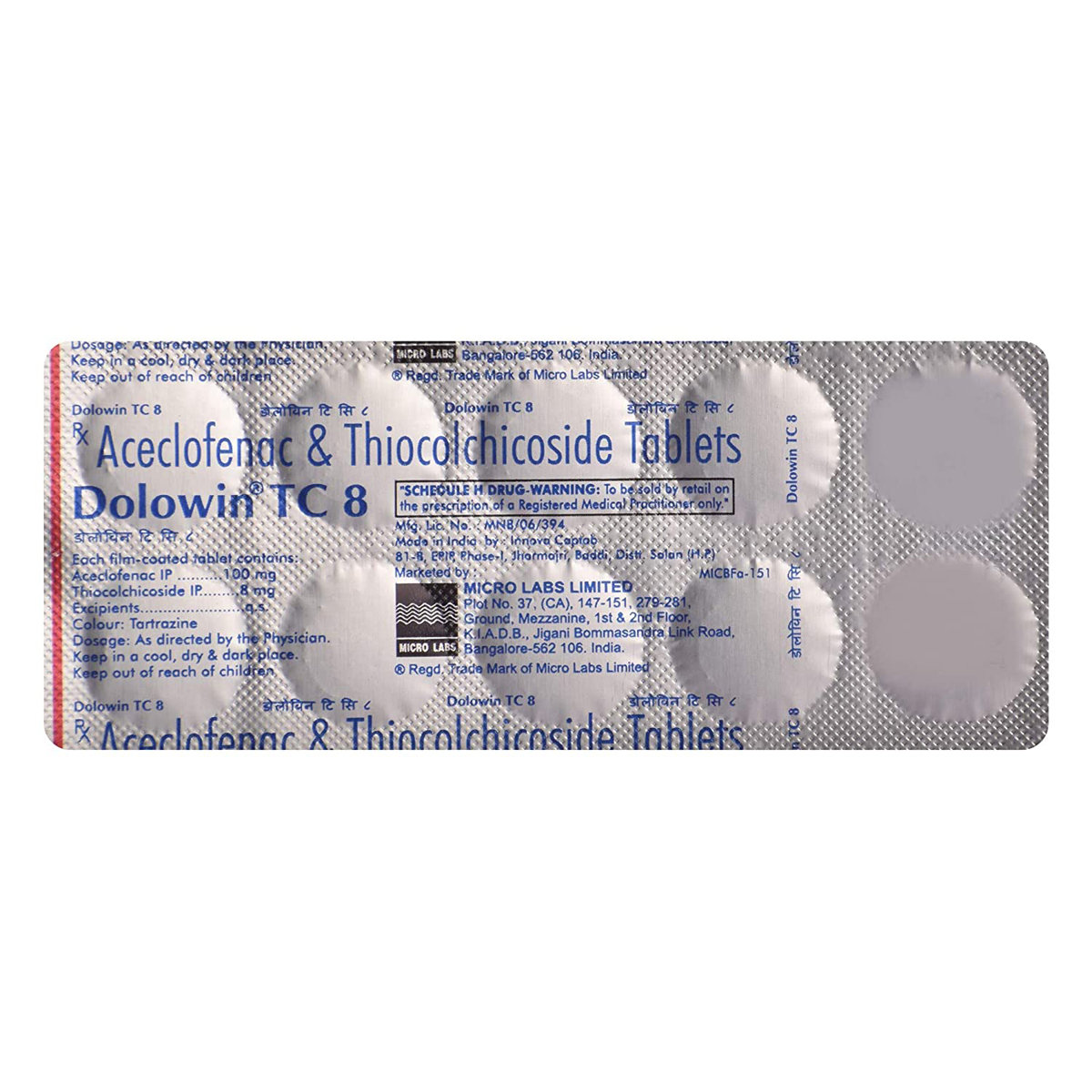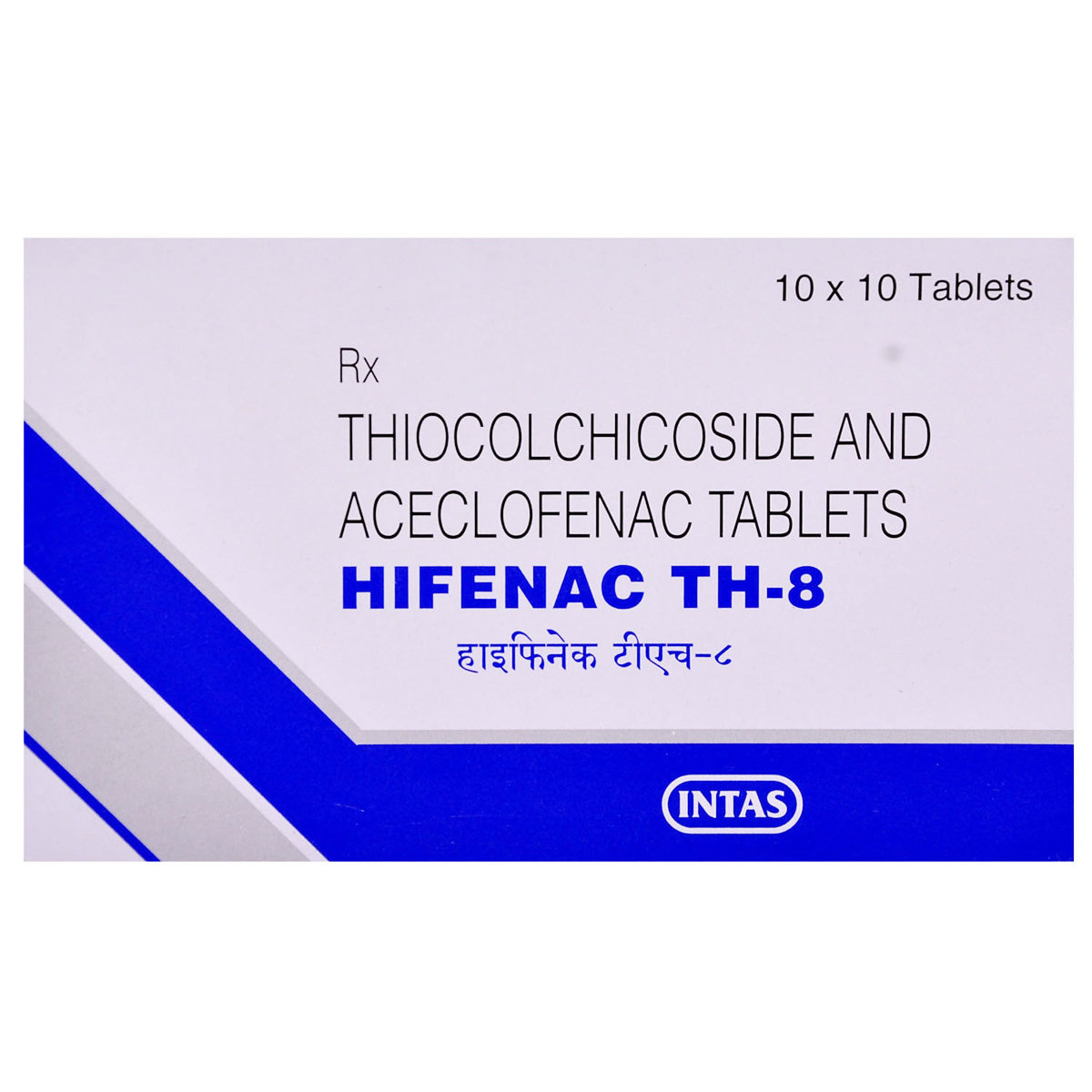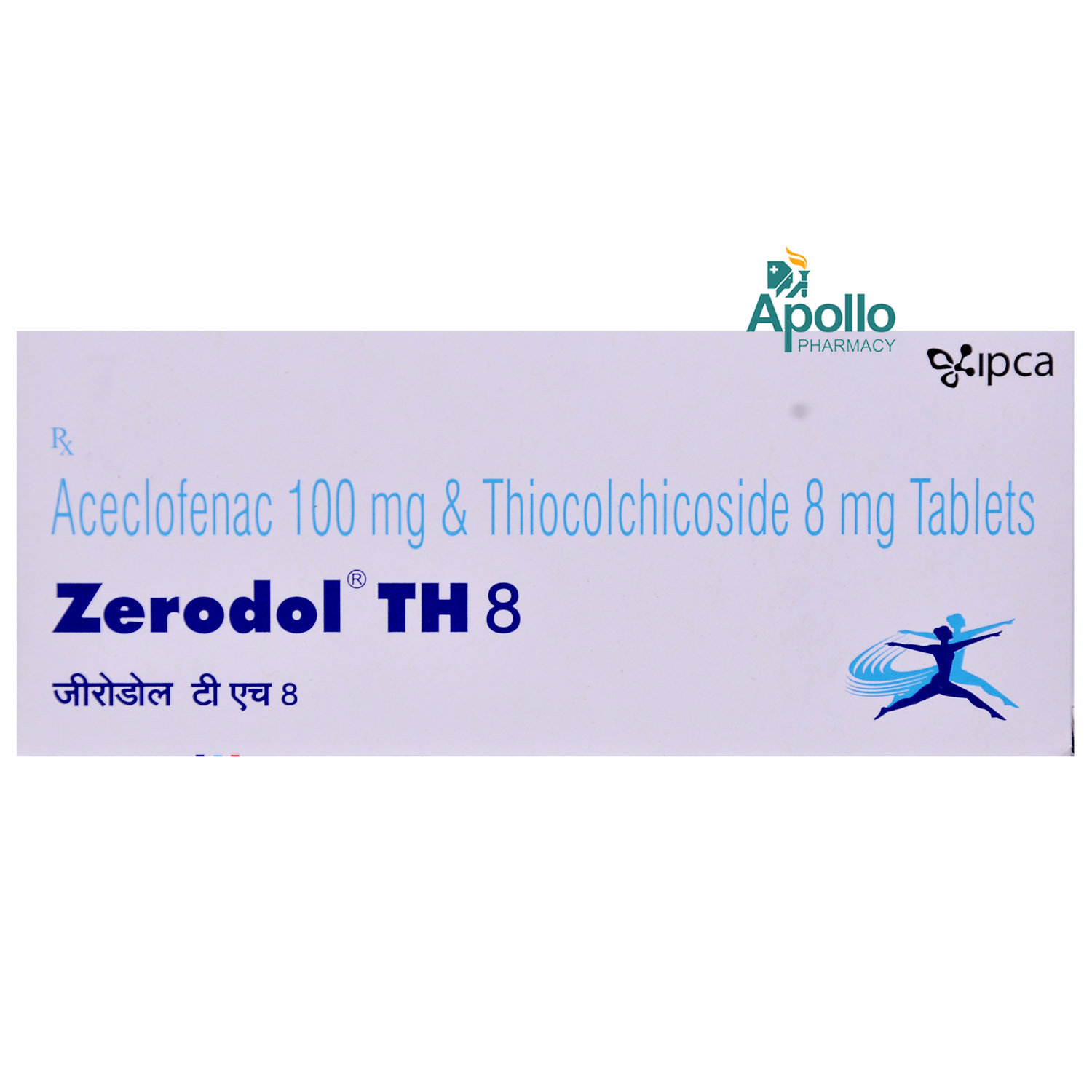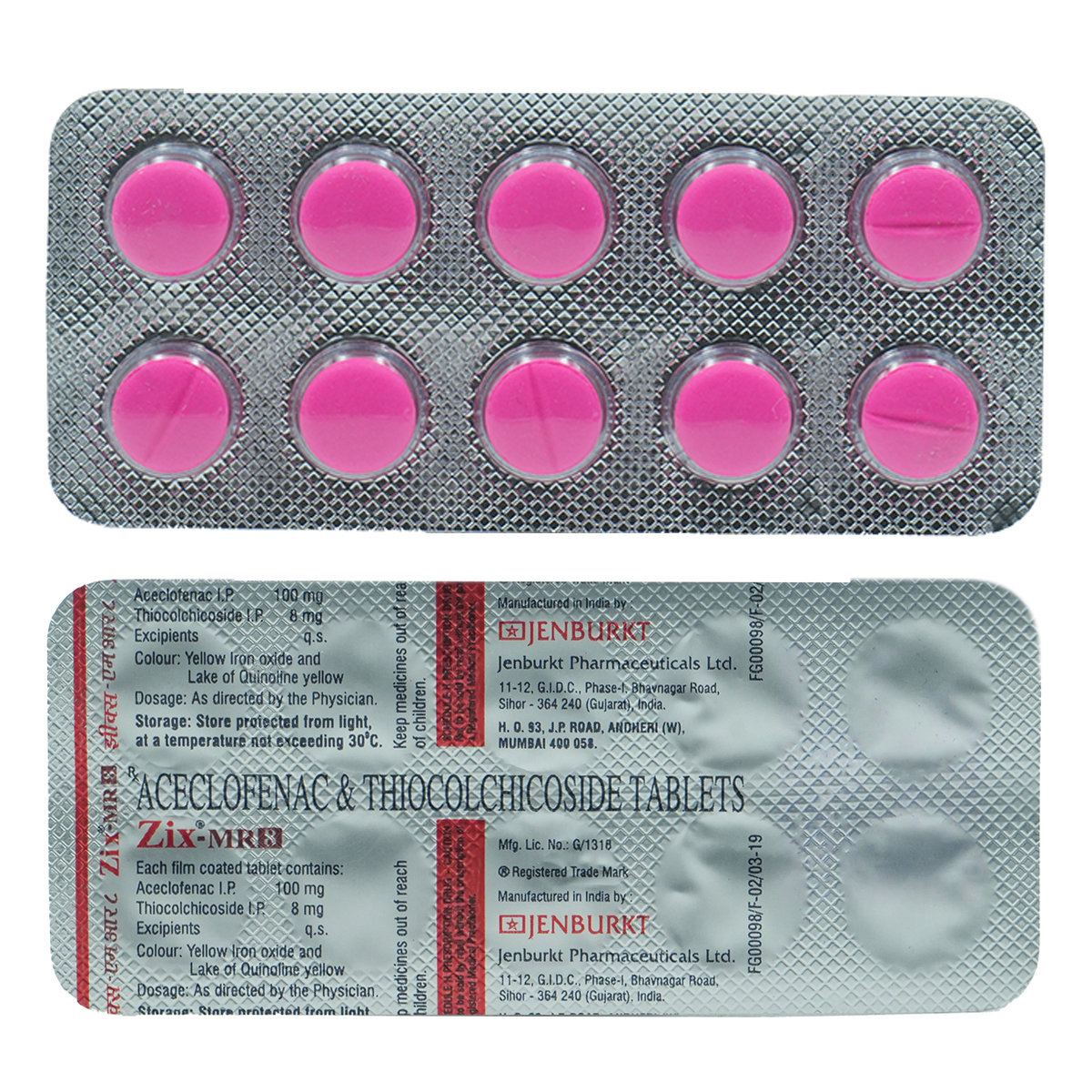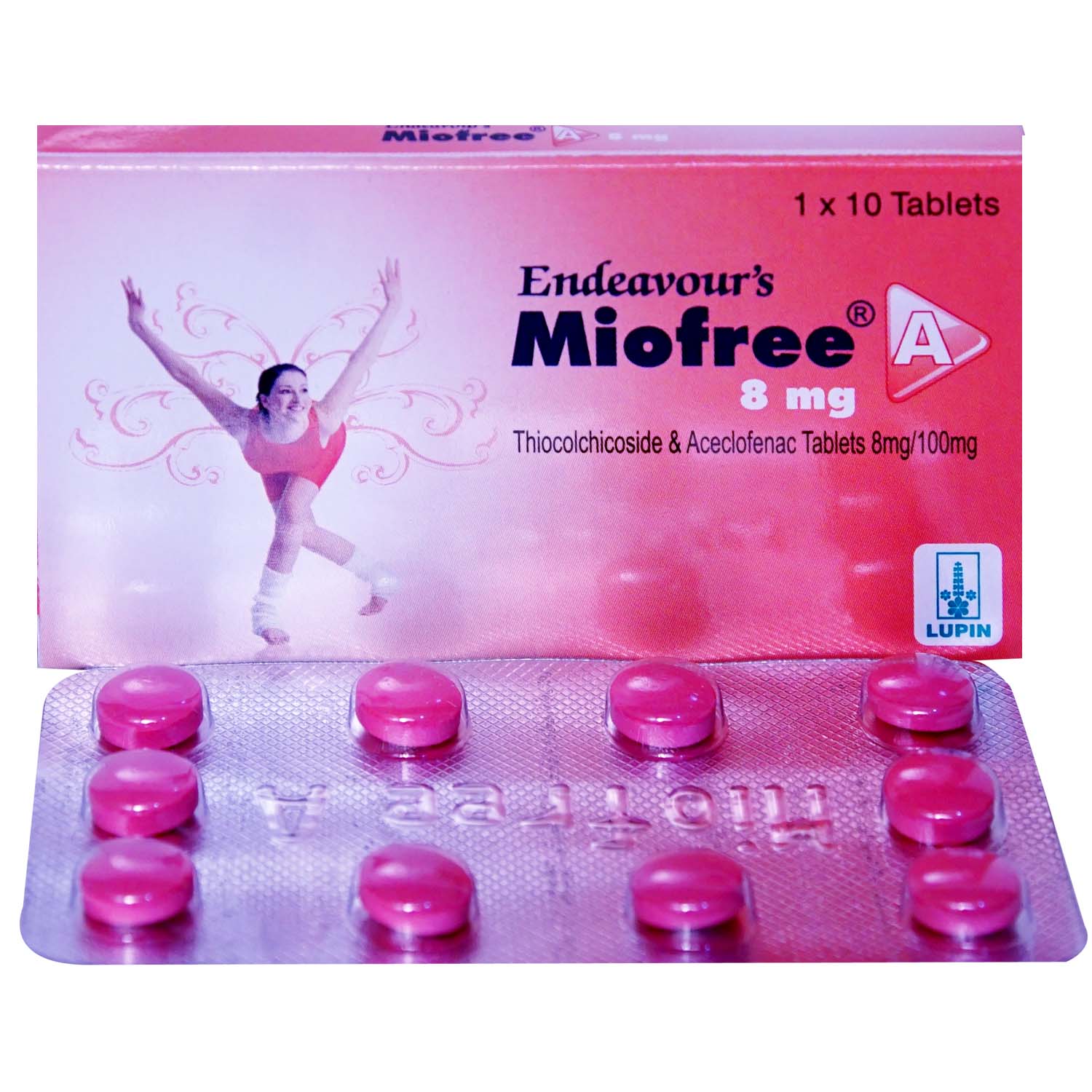Thiozen-8 Tablet 10's
MRP ₹271.5
(Inclusive of all Taxes)
₹40.7 Cashback (15%)
Provide Delivery Location
Online payment accepted
 Prescription drug
Prescription drugWhats That
Composition :
Manufacturer/Marketer :
Consume Type :
Expires on or after :
Return Policy :
About Thiozen-8 Tablet
Thiozen-8 Tablet is a combination medication used to reduce and relieve pain due to muscle spasms (painful muscular contractions) associated with degenerative vertebral disorders, vertebral static problems, dorsal pain, low back pain, and torticollis (neck muscle contractions).
Thiozen-8 Tablet is a combination of two drugs: Thiocolchicoside (muscle relaxant) and Aceclofenac (a non-steroidal anti-inflammatory drug). Thiocolchicoside is a muscle relaxant that works on the centres of spinal cord and brain. This helps relieve muscle stiffness and improves muscle movements, thereby relieves pain due to muscle spasms. Aceclofenac is a non-steroidal anti-inflammatory drug (pain killer) that works by blocking the action of cyclo-oxygenase (COX) enzyme in the body involved in the production of certain chemical substances such as prostaglandins that cause pain and swelling.
Take Thiozen-8 Tablet as prescribed. Your doctor will advise you on how often you take your tablets based on your medical condition. You may experience diarrhoea, dizziness, nausea, vomiting, stomach pain, or increased liver enzymes in the blood in some cases. Most of these side effects of Thiozen-8 Tablet do not require medical attention and gradually resolve over time. However, if the side effects persist or worsen, please consult your doctor.
If you are allergic to Thiozen-8 Tablet or any other medicines, please tell your doctor. Thiozen-8 Tablet is not recommended for children below 18 years of age. Avoid taking Thiozen-8 Tablet if you are pregnant as it may cause harm to the foetus. Thiozen-8 Tablet is excreted in breast milk. Therefore, Thiozen-8 Tablet is contraindicated in breastfeeding women as it may cause adverse effects in the baby. If you have asthma, diabetes, high blood pressure, stomach ulcer, high cholesterol, chickenpox, porphyria (rare inherited disorder), systemic lupus erythematosus (an autoimmune disease), ulcerative colitis or Crohn’s disease (conditions causing swelling of the bowel, diarrhoea, bowel pain, vomiting and weight loss), galactose intolerance, Lapp lactase deficiency, glucose-galactose malabsorption, G-6-PD deficiency (a hereditary condition resulting in low red blood cell counts), fits, muscular hypotonia (decreased muscle tone), flaccid paresis (loose and floppy limbs), bleeding or blood clotting disorders, kidney, liver or heart diseases, inform your doctor before taking Thiozen-8 Tablet .
Uses of Thiozen-8 Tablet
Directions for Use
Key Benefits
Thiozen-8 Tablet is a combination of two drugs, namely: Thiocolchicoside and Aceclofenac used to treat pain due to muscle spasms. Thiocolchicoside is a muscle relaxant that works on the centers of the spinal cord and brain. This helps relieve muscle stiffness and improves muscle movements, thereby relieving pain due to muscle spasms. Aceclofenac is a non-steroidal anti-inflammatory drug (pain killer) that works by blocking the action of the cyclo-oxygenase (COX) enzyme in the body that is involved in the production of certain chemical substances such as prostaglandins that cause pain and swelling.
Storage
- Inform your doctor about dizziness symptoms. They may adjust your medication regimen or prescribe additional medications to manage symptoms.
- Follow your doctor's instructions for taking medication, and take it at the same time every day to minimize dizziness.
- When standing up, do so slowly and carefully to avoid sudden dizziness.
- Avoid making sudden movements, such as turning or bending quickly, which can exacerbate dizziness.
- Drink plenty of water throughout the day to stay hydrated and help alleviate dizziness symptoms.
- If you're feeling dizzy, sit or lie down and rest until the dizziness passes.
- Track when dizziness occurs and any factors that may trigger it, and share this information with your doctor to help manage symptoms.
- Take medications with food (if recommended): It can help prevent stomach distress and indigestion.
- Eat smaller, more frequent meals: Divide daily food intake into smaller, more frequent meals to ease digestion.
- Avoid trigger foods: Identify and avoid foods that trigger indigestion, such as spicy, fatty, or acidic foods.
- Stay upright after eating: Sit or stand upright for at least 1-2 hours after eating to prevent stomach acid from flowing into the oesophagus.
- Avoid carbonated drinks: Avoid drinking carbonated beverages, such as soda or beer, which can worsen indigestion.
- Manage stress: To alleviate indigestion, engage in stress-reducing activities like deep breathing exercises or meditation.
- Consult a doctor if needed: If indigestion worsens or persists, consult a healthcare professional to adjust the medication regimen or explore alternative treatments.
- Inform your doctor about the nausea and discuss possible alternatives to the medication or adjustments to the dosage.
- Divide your daily food intake into smaller, more frequent meals to reduce nausea.
- Opt for bland, easily digestible foods like crackers, toast, plain rice, bananas, and applesauce.
- Avoid certain foods that can trigger nausea, such as fatty, greasy, spicy, and smelly foods.
- Drink plenty of fluids, such as water, clear broth, or electrolyte-rich beverages like coconut water or sports drinks.
- Use ginger (tea, ale, or candies) to help relieve nausea.
- Get adequate rest and also avoid strenuous activities that can worsen nausea.
- Talk to your doctor about taking anti-nausea medication if your nausea is severe.
- Record when your nausea occurs, what triggers it, and what provides relief to help you identify patterns and manage your symptoms more effectively.
- Inform Your Doctor: Notify your doctor immediately about your diarrhoea symptoms. This allows them to adjust your medication or provide guidance on managing side effects.
- Stay Hydrated: Drink plenty of fluids to replace lost water and electrolytes. Choose water, clear broth, and electrolyte-rich drinks. Avoid carbonated or caffeinated beverages to effectively rehydrate your body.
- Follow a Bland Diet: Eat easy-to-digest foods to help firm up your stool and settle your stomach. Try incorporating bananas, rice, applesauce, toast, plain crackers, and boiled vegetables into your diet.
- Avoid Trigger Foods: Steer clear of foods that can worsen diarrhoea, such as spicy, fatty, or greasy foods, high-fibre foods, and dairy products (especially if you're lactose intolerant).
- Practice Good Hygiene: Maintain good hygiene to prevent the spread of infection. To stay healthy, wash your hands frequently, clean and disinfect surfaces regularly, and avoid exchanging personal belongings with others.
- Take Anti-Diarrheal Medications: If your doctor advises, anti-diarrheal medications such as loperamide might help manage diarrhoea symptoms. Always follow your doctor's directions.
- Keep track of your diarrhoea symptoms. If they don't get better or worse or are accompanied by severe stomach pain, blood, or dehydration signs (like extreme thirst or dark urine), seek medical help.
Drug Warnings
If you are allergic to Thiozen-8 Tablet or any other medicines, please tell your doctor. Thiozen-8 Tablet is not recommended for children below 18 years of age. Avoid taking Thiozen-8 Tablet if you are pregnant as it may cause harm to the fetus. Thiozen-8 Tablet is excreted in breast milk. Therefore, Thiozen-8 Tablet is contraindicated in breastfeeding women as it may cause adverse effects on the baby. Do not consume alcohol with Thiozen-8 Tablet as it may increase the risk of severe adverse effects. If you have asthma, diabetes, high blood pressure, stomach ulcer, high cholesterol, chickenpox, porphyria (rare inherited disorder), systemic lupus erythematosus (an autoimmune disease), ulcerative colitis or Crohn’s disease (conditions causing swelling of the bowel, diarrhoea, bowel pain, vomiting, and weight loss), galactose intolerance, Lapp lactase deficiency, glucose-galactose malabsorption, G-6-PD deficiency (a hereditary condition resulting in low red blood cell counts), fits, muscular hypotonia (decreased muscle tone), flaccid paresis (loose and floppy limbs), bleeding or blood clotting disorders, kidney, liver or heart diseases, inform your doctor before taking Thiozen-8 Tablet .
Drug-Drug Interactions
Drug-Drug Interactions
Login/Sign Up
Co-administration of Atenolol with Thiozen-8 Tablet could increase the risk of low blood pressure.
How to manage the interaction:
Although there is a possible interaction between Atenolol and Thiozen-8 Tablet, you can take these medicines together if prescribed by a doctor. Consult a doctor if you experience excessive sweating, shortness of breath, palpitations, or chest discomfort. Do not discontinue any medications without consulting a doctor.
Drug-Food Interactions
Drug-Food Interactions
Login/Sign Up
Diet & Lifestyle Advise
- Regular exercise helps in muscle stretching so that they are less likely to spasm, tear and sprain. Mild exercises such as jogging and walking are helpful for muscle stretching.
- Massages can also be helpful.
- Avoid freezing and hot temperatures.
- Avoid wearing tight-fitting clothes, instead, wear loose garments.
- Rest well, and get plenty of sleep.
- To avoid developing pressure sores, change your position at least every two hours.
- Hot or cold therapy can help treat muscle spasms. Apply an ice pack or hot-pack on the muscle for 15-20minutes.
- Stay hydrated, drink plenty of water.
Side Effects of Thiozen-8 Tablet
- Diarrhoea
- Dizziness
- Nausea
- Vomiting
- Stomach pain
- Increased liver enzymes in the blood
Habit Forming
Therapeutic Class
All Substitutes & Brand Comparisons
RX
THIOFORD TABLET
Leeford Healthcare Ltd
₹164
(₹14.76 per unit)
39% CHEAPERRX
Thiorex 8 mg Tablet 10's
Medilab India
₹243.5
(₹21.92 per unit)
10% CHEAPERRX
Out of StockNimulid-ATH 8 Tablet 10's
Mankind Pharma Pvt Ltd
₹264.5
(₹23.81 per unit)
2% CHEAPER
Author Details
We provide you with authentic, trustworthy and relevant information
Drug-Diseases Interactions
Drug-Diseases Interactions
Login/Sign Up
FAQs
Drug-Drug Interactions Checker List
- LISINOPRIL
- ENALAPRIL
- CANDESARTAN
- LOSARTAN
- CLONIDINE
- MOXONIDINE
- METHYLDOPA
- PROPRANOLOL
- CIPROFLOXACIN
- MOXIFLOXACIN
- OFLOXACIN
- LEVOFLOXACIN
- FUROSEMIDE
- AMILORIDE
- HEPARIN
- WARFARIN
- CLOPIDOGREL
- METHOTREXATE
- ZIDOVUDINE
- GLICLAZIDE
- TOLBUTAMIDE
- GLIBENCLAMIDE
- IBUPROFEN
- NAPROXEN
- ASPIRIN
- CELECOXIB
- ETORICOXIB
- HYDROCORTISONE
- PREDNISOLONE
- MIFEPRESTONE
- CICLOSPORIN
- TACROLIMUS
- LITHIUM
- DIGOXIN
- FLUOXETINE
- PAROXETINE
- SERTRALINE
- FLUVOXAMINE
- CITALOPRAM
- ESCITALOPRAM
- HYDRALAZINE
Special Advise
Regular tests are recommended to monitor liver functioning and liver enzymes while taking Thiozen-8 Tablet .
Disease/Condition Glossary
Pain: It is a symptom triggered by the nervous system, causing uncomfortable sensations in the body. Muscle spasm is the sudden involuntary contractions of the muscle, which can be painful and uncomfortable. When the nerve impulses that control the muscle movements are damaged or interrupted, it could lead to muscle spasms. Symptoms include muscle tightness, joint stiffness, unusual posture, difficulty in moving, and pain in affected muscles and joints. Fatigue (weakness), stress, extreme heat or cold, infection, and tight clothing can trigger muscle spasms. Muscle relaxants and exercise can treat muscle spasms. Muscle relaxants sedate the muscle and help in inhibiting painful contractions. Whereas, exercise helps in muscle stretching to be less likely to spasm, tear and sprain.

Have a query?
Alcohol
Safe if prescribed
You are recommended to avoid alcohol consumption with Thiozen-8 Tablet as it may increase the risk of severe adverse effects.
Pregnancy
Consult your doctor
Thiozen-8 Tablet is not recommended for pregnant women, especially in the last 3 months of pregnancy as it may cause harm to the foetus. However, please consult your doctor if you are pregnant.
Breast Feeding
Consult your doctor
Avoid breastfeeding while taking Thiozen-8 Tablet as it may be excreted in breast milk and cause adverse effects in the baby. However, please consult a doctor if you are breastfeeding.
Driving
Safe if prescribed
Thiozen-8 Tablet may cause drowsiness, tiredness, dizziness or vision problems in some people. Therefore, avoid driving if you feel any of these symptoms after taking Thiozen-8 Tablet .
Liver
Consult your doctor
Take Thiozen-8 Tablet with caution, especially if you have a history of Liver diseases/conditions. The dose may be adjusted by your doctor as required. Avoid taking Thiozen-8 Tablet if you have severe liver failure.
Kidney
Consult your doctor
Take Thiozen-8 Tablet with caution, especially if you have a history of Kidney diseases/conditions. The dose may be adjusted by your doctor as required. Avoid taking Thiozen-8 Tablet if you have severe kidney disease.
Children
Safe if prescribed
Thiozen-8 Tablet is not recommended for children as the safety and effectiveness were not established.





